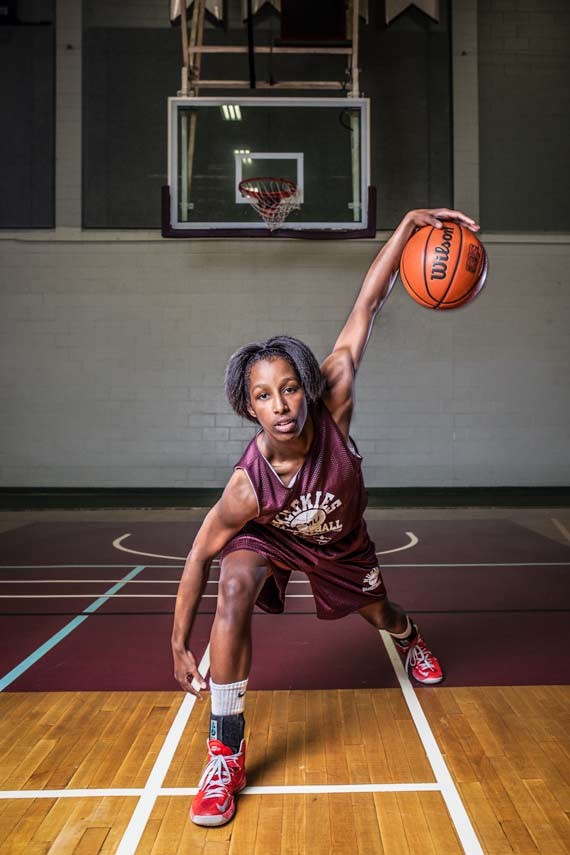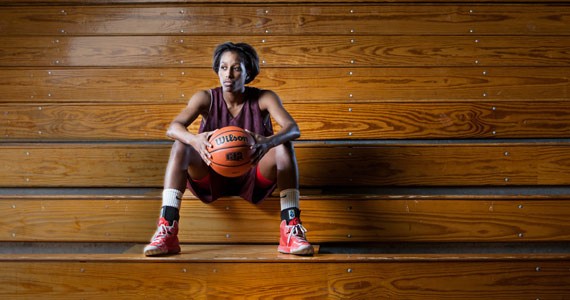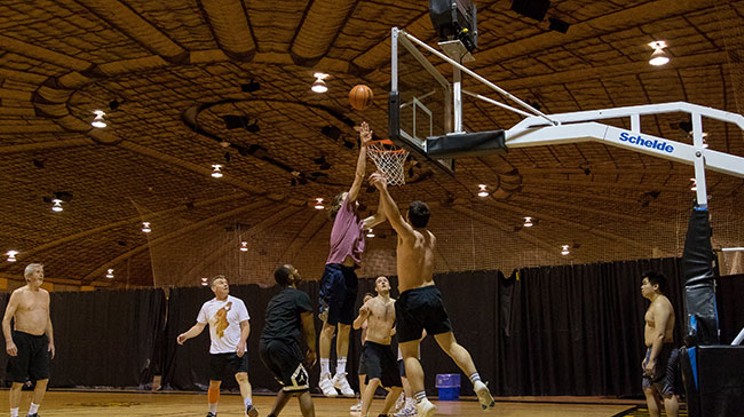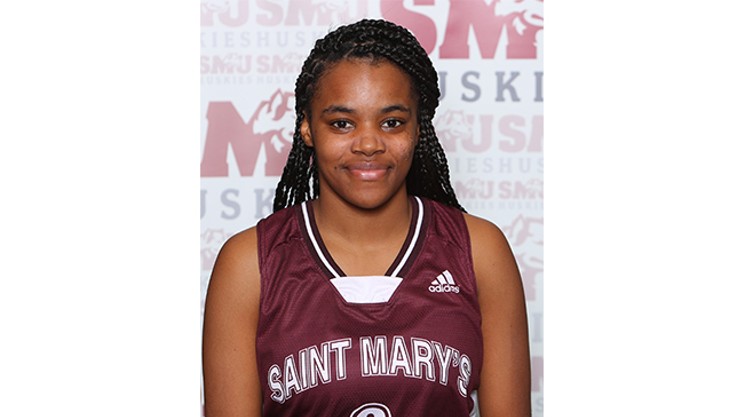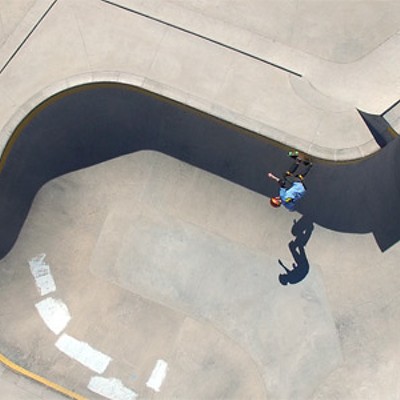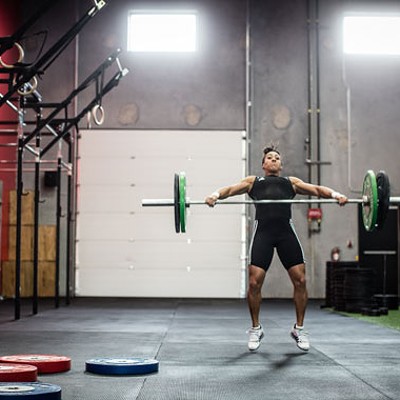"This is my last year, and I have one more goal as a university player, and that's to win the national championship," says Justine Colley, senior player on the Saint Mary's University Huskies women's basketball team. She is the force propelling SMU to the top: The team went undefeated in the regular season, and is ranked second in the country with the regional and national championships coming up.
As her fifth season with SMU nears its end, the five-foot-nine East Preston guard will leave varsity athletics as the all-time top scorer in Canadian Interuniversity Sports league history, with over 2,300 career points, and a peak of 565 season points in 2013. She was named CIS Player of the Year last year---the first time a player from the Atlantic University Sport conference ever won the award---and stands to win it again.
While Colley focuses on numbers as a finance major at the Sobey School of Business, her stats on the court are the last thing on her mind. Colley's success, the likes of which has been unseen in the AUS since SMU's last title in 1976, is the result of her team-based attitude. Even as the top scorer, Colley says her focus is on the whole team.
"We have so much scoring ability as a team. It's harder to shut down four players than it is one," she says. Colley stats are followed by fellow guard and childhood friend Rachelle Coward, and forward Laura Langille not far behind. "We have a lot of threats."
Last year in Regina, the Huskies won their first-ever CIS medal, bronze, at the national championships after sweeping the AUS. This year, the team is going for gold. The Huskies head to the AUS championships the March 7 weekend at the University of Prince Edward Island. If they win, they'll head to the University of Windsor for the CIS finals starting March 14.
In all senses of the word, Colley is a leader. On the court, she's vocal, focused and fast. Teammates look to her for cues and direction, and her skill is mesmerizing. Whether longshot or rebound, she's already on to the next play before the ball makes the swoosh. But if it's not game day, you would never know she's SMU's secret weapon. Ferocious and serious under the net, she is warm and gracious as soon as the clock stops.
"I named her captain from day one," says coach Scott Munro, who has been with the team since 2008, and has supported Colley since her first season in 2009. "Over the past five seasons, we've been able to attract some very good players around her, as well."
As the oldest player on the team, Colley has experienced five versions of the Huskies. "Each year we've had something different. Good post players, really good shooting guards, great defenders and great drivers," she says. "Now, we have a combination of girls who can do both: drive and get to the basket, but also step out and shoot the ball."
There is no doubt that Colley has natural talent for the sport. But her power during play comes from years of experience and dedication to her constant growth as a player. "I started playing when I was eight, in grade 3, with the JC Rockets under coach Curtis Coward, who is the dad of Rachelle Coward, who is also on our team," she says.
Even as a kid, Colley stood out among her peers."When I started, I was playing with girls in the 10 to 12 age group. They felt like my skill was too good for my age." Colley continued to level-up on local and provincial teams. For high school, she enrolled at the Halifax Grammar School on Tower Road, just across the street from SMU.
"My whole career there, I also played upper-level, and I think that's why I've been able to make such a strong impact now at the university level, because I'm used to playing at such high levels of competition," she says. Colley averages about 28 points per game.
Colley's decision to play for SMU had a lot to do with her personality. For one thing, she appreciates the home court advantage and she's proud to represent Nova Scotia. Because the Grammar School shares facilities, Colley was already comfortable on campus. She practiced in the gym she now plays in, and she felt the community at SMU.
"For me, it's been the people around me, in the locker room, the coaching staff. It's all about the people and personalities that contribute to the team," she says. "Scott's done a really good job of making sure we have players who don't have huge egos, who are very selfless and want to go the extra mile for their teammates, and we notice that off the court. We're all really good friends and I think that's a huge part of being a really strong team."
Community motivates this player. Colley spends summers coaching children's basketball camps at Saint Mary's, after years as a camp counsellor for the Boys and Girls Club of Preston. Teaching and coaching is one important method to continue learning.
Unfazed by older players, her early varsity seasons set her up for international competition. She was invited to multiple training camps for Team Canada's senior teams. "After each week, I was so bruised and tired, physically not fully mature, and also mentally. I didn't know enough about the game to compete at those levels. That happened three times before I succeeded in making the team last summer. And it was amazing."
Team Canada's Senior Women's team, which represents Canada at the Olympics, played various tournaments between May and September last year, bringing home the nation's first silver medal in the International Basketball Federation's competition. "It was very overwhelming," says Colley. "It was just completely different than varsity, in terms of the social aspect, on the court and off the court."
The oldest at SMU, Colley says she was "one of the babies" on Team Canada. "And obviously the competition was 10 times different: bigger, stronger, faster, more athletic, smarter, everything about the game was a whole different level, which helped me improve my game, and why I've been doing so well this season. Being able to distribute, working harder, when to make that extra pass. Those were all tactics that I picked up with my experience on Team Canada."
The opportunity to play for Team Canada was not one she took for granted. Playing with teammates who averaged over six feet tall improved her court strategy. Without reliance on vertical moves, average-height players need to excel by speed and accuracy. "That's why Allen Iverson was one of my favourite players," she says of the NBA MVP, who at six feet is only three inches taller than Colley. "He was always the small, quick guy and that's what I was known for. I really admired him growing up. I had the jerseys. I think my first pair of sneakers was the i3s."
With all of Colley's experiences to date, it's no wonder she's helped the Huskies accomplish so much in such a short time. It all comes down to complete dedication. "An average week for us during the season, well, it's basically a full-time job," she laughs. Because SMU is near to its rival universities, the team travels weeknights and weekends. "We normally get the day off after a game, depending. If we play Wednesday and then Friday, we don't get Thursday off because we need that time to prepare."
Practices last an hour or two, with an additional few hours for skill development. "For myself, being one of the key players on the team, I get a lot of conditioning during the games, but for some of the girls who are younger and who don't have as much playing time, they need to maintain some type of conditioning," she says. "So, I mean, two or three times a week you're on your own in the gym, and every single day is either a practice or a game. And that's all on top of your school studies and academic obligations."
In fact, Colley's school schedule was a major consideration for staying in Canada. Leagues like the NCAA only allow four years of play, and players have to make up the course work in the summer to graduate on time. "No, I like my summers," Colley laughs.
But her decision to play in Canada, especially the Atlantic, has been an invaluable asset for the AUS league in general and for increasing support of women's sports, too. In a national sense, the Atlantic region hasn't been known for its basketball skill until the last few years. Colley says that's likely due to hockey and football's popularity.
"But I think the interest is starting to come. More girls seem to be interested, and this year, we've had more local, junior teams come out than any other year. And they're all saying, 'I want to be in your shoes' and they're getting autographs from our girls. They're looking up to us and hopefully they keep that dream alive. Hopefully they end up here at Saint Mary's or Dal or Acadia, but I hope whatever they do, they play in the AUS."
The aura of victory that surrounds the Huskies appears to be inspiring highly competitive play in the younger leagues. Citadel High's girls' team, the Phoenix, is currently undefeated the last two years, unprecedented to date, and will play in the Nova Scotia School Athletic Federation provincial championships at Citadel High this weekend. Two current Huskies, guard Alexandra Smye and guard Angie Carvery, played for the Phoenix before SMU.
"Up until last year, we haven't had a reputation as a strong team," says Colley. "A lot of people say, 'Oh, you're good for the AUS,' know what I mean? But one way to get rid of that stereotype is for the strong players who come out of Atlantic Canada to stay in Atlantic Canada. Hopefully that's what I've been able to show the younger girls: Stay home and develop the AUS reputation of being powerhouses and competitive at the national level."
Aside from home-cooked meals and laundry days, staying close to home has been an integral part of Colley's success. Five of the team's 11 players are from Nova Scotia, which also contributes to game attendance. From Colley's parents to her pastor to her camp students, "it means a lot to see familiar faces at games and have that support." Plus, there's an energy difference playing in front of 300 people instead of 50. She's also noticed that the women's team is attracting more spectators than the men's.
"I see the attraction of men's ball. They're faster, they can jump higher, they can dunk. It makes for a more exciting game for those who don't know the fundamentals." But in terms of strategy, team skill and intelligence, her team has a lot to offer. Colley says high or low, you can't let turnout affect what you contribute to the game.
"Every game, I want to make sure I show the hard work that not only myself but my community has put into me, and show how I'm positively affecting Nova Scotia and East Preston," she says. "I've been able to show that you don't have to go far to be successful."
Almost everything Colley says is optimistic. It's the mindset of an all-star. She says she learned to strive for the best and see the positive in everything from her family. "My parents have done a lot for me and my four siblings. We grew up in a small community and we always found a way. They made it obvious to us that we could do whatever we set our minds to, regardless of financial situation, location or position in life," she says. "I know the media more often highlights the negatives that come out of East Preston, but my parents instilled in us that's not what our community is about.
"They said that we would be some of the positives that come out of East Preson, and a large part of that was making sure we had the academics. We've all gone through the school system and we worked really hard to get there. They made us realize we could be happy, we can reach our goals and a lot of my outlook in life comes from my parents."
It's also the focus on academics that makes or breaks players, Colley adds. "To be able to compete at higher levels, you need the academics, because after high school, the stepping stone to the NBA or WNBA is varsity. I've seen great players not be able to pursue their goals and dreams because they didn't back it up academically."
Recognizing the profit limitations in women's basketball, with lower-paying leagues and few endorsement deals, Colley hopes girls see sport as a lifetime investment. "The academics is the overall payout. For me to be able to come to one of the best business schools in Canada with no loans or debt because of scholarships, that is huge for me. To be able to establish a degree that I'll be able to use after my season's over," she says. "So whatever the sport may be, whatever the dream, sport is a tool to a career, to your next 20 years."
Still, Colley plans to carry on in basketball after she graduates, either as a player or a coach. She hopes to try out again for Team Canada later this year, and she's starting to consider agents for WNBA scouting, while looking at overseas leagues in Europe and Australia. She loves the travelling she's done as a player and she wants more of it.
"I've been blessed to do this. And what I've seen of the world, I want to see more," she laughs. "The sky's the limit. I can go anywhere and do basically anything." But those decisions will come in time. First, she wants to win the nationals.
"I can't let things that happen individually distract me from the overall team goal. It's the team mindset. I have 10 other girls in the locker room, on the bench, on the court with me and if I think about it as just myself, I'm going to let someone else down out there," she says. "Maybe in a few years time I can sit back and think about what I accomplished here, but right now my goal is to win the AUS and then get that national championship."
Given the team's incredible season, Colley thinks the Huskies have a good shot. "Scott's made sure we are consistently defensive. They always say defense wins games, offense fills seats and rebounds win championships. I feel like a lot of our success has been on our defence and our rebounding ability. That's what I'd take into coaching.
"It's not so much about how often I score, but how much the team can develop as a whole, so I feel like in the last two years, I've really tried to get everyone involved, that everyone has their hands on the ball, that they can make the right decision during hard play. Because if I get fouled out or another star gets fouled out, we have to have people ready to fill those shoes. So I think that's where my growth has been over my time here."
For Munro, CIS's 2013 Coach of the Year, Colley is an unbelievable competitor who comes along once a lifetime. "She never has an off day. She takes care of her own work ethic and energy first and the other players feed off that," he says. Colley agrees. "That's the first step to being a leader: leading myself and taking ownership out there, and trying my best to show that you always have to try your hardest."
Munro says Colley has played such a prominent role for SMU, it will not be easily filled next year. "You can't replace a player like her. She brought a lot of skill, intensity and leadership to us over the past five seasons." But he believes that her influence over returning players like Coward, Carvery and Laura Langille will continue to build on their success.
"I try not to think too much about it. I take it one practice at a time, one game at a time," Colley says. "You're supposed to go out there and have fun. It was never really in my mind to be the all-time leading scorer across Canada. I just really wanted to win." a

